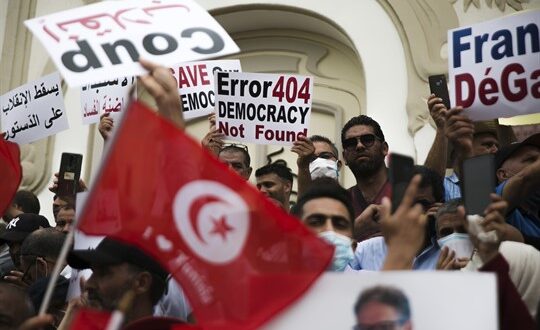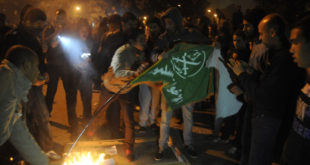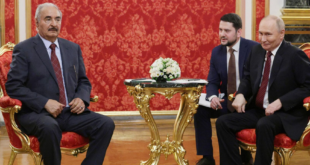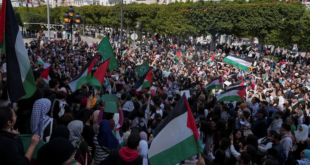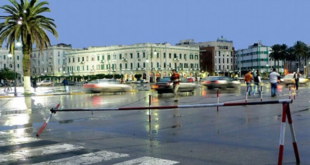It’s a bitter irony that the last embers of the Arab Spring may be snuffed out in the same place, Tunisia, where a spark first ignited massive pro-democracy fires across a region filled with dictatorships. Tunisians, at least some of them, seem to be stirring from their jaded acceptance of a presidential coup. Still, the one country that emerged from the Arab uprisings with a semblance of democracy looks like it’s returning to what was the norm before the revolutions it unleashed in 2010.
Last Sunday, thousands of people turned out to protest in the Tunisian capital, where President Kais Saied, once a revered professor of constitutional law, has launched a series of moves that, despite his denials, are very clearly a coup.
Saied’s initial steps to trample the constitution and dismantle any semblance of democracy in the North African country came in late July, when he abruptly fired the prime minister and disbanded Parliament. Popular reaction ranged for the most part from blasé acceptance to strong support.
The contrast with the heady days of what was optimistically branded the Arab Spring could not be more striking. Back in December 2010, when the Tunisian street vendor Mohamed Bouazizi immolated himself after police took away his meager fruit cart, he triggered a wave of revolutions that swept across the greater Middle East, mobilizing millions of people, toppling deeply entrenched dictators and raising hopes that a new era of democracy and prosperity might wash over Arab-majority countries from North Africa to western Asia.
But those hopes were dashed in most places, and often things turned out much worse than that. Popular protests did force Tunisia’s dictator of 23 years, Zine El Abidine Ben Ali, to resign. Other leaders, like Egypt’s Hosni Mubarak, soon followed. But only Tunisia managed to stay on a democratic path, however flawed. In some countries, the initial protests led to disaster and calamity. Some dictators refused to follow Ben Ali or Mubarak’s example. Syria’s Bashar al-Assad set out to crush the rebellion that arose against him, and before long, the country sank into an apocalyptic civil war in which democracy advocates became only one of many players, with religious extremists, terrorist groups and outside powers all drawn into the maelstrom.
Civil wars similarly engulfed Libya and Yemen, whose leaders were also driven from power. In Egypt, after a brief democratic interlude following Mubarak’s ouster, an even more repressive dictatorship returned.
Only in Tunisia did the democratic revolution survive. But the results were disappointing. Hopes that democracy would bring prosperity, good governance and an end to corruption have been frustrated. A bad situation turned worse in the past 18 months amid the harsh economic and social toll of the coronavirus pandemic. With poverty rising, hospitals overflowing and politicians seemingly unable to mount a response to the crisis, there was little enthusiasm for defending the limping system.
That’s why when Saied made his anti-democratic move on July 25, Republic Day, it didn’t trigger a reaction in any way commensurate with the passion that Tunisians exhibited in their quest to establish democracy.
The people were fed up and disillusioned. Many celebrated the ouster of an unpopular prime minister and parliament, thinking it might be a necessary step toward solving the crisis. Besides, Saied denied he had any intention of monopolizing power. He was only cleaning house.
“Why do you think that, at 67, I would start a career as a dictator?” the 63-year-old Saied, quoting Charles de Gaulle, told a New York Times journalist, by way of dismissing any thought that he would uproot democracy. Instead, he tried to justify his moves on democratic terms, explaining that even Abraham Lincoln had to resort to extreme measures to save the United States during the Civil War.
Saied still maintains that his measures are meant to get the country through a rough period. But fewer Tunisians believe him now.But after also insisting in the same interview that there was no threat to freedom of speech “and no fear as to the right of the people to protest,” he subsequently banned gatherings of more than three people and shut down some media offices. Later, several members of the disbanded parliament were arrested, including some notable critics.
Saied still maintains that his measures are meant to get the country through a rough period. But fewer Tunisians believe him now. Widespread alarm about his intentions only seemed to emerge last week, after an announcement from Saied’s office that he was putting in place an entirely new governing system—one that would, among other things, override the country’s democratic constitution, approved in 2014 after years of deliberation and negotiations following the revolution.
The announcement in the government’s legislative gazette summarily explained that any part of the constitution that conflicts with Saied’s new model is no longer in effect.
Under Saied’s plan, the president would have the power to emit “legislative texts”—rule by decree—and choose the members of his Cabinet, both functions that are strictly the responsibility of parliament under the country’s current basic law. On Wednesday, Saied went ahead and appointed a new prime minister, Najla Bouden Romdhane, a geophysicist with no governing experience. She becomes the first woman to lead an Arab government, a genuine milestone, but Saied remains the one exercising power. She is just a manager.
The announcement also noted that members of parliament would no longer receive their salaries or enjoy immunity from prosecution.
Two months after sacking the prime minister and claiming he had no intention of becoming a dictator, Saied, in unveiling his governing design, made it clear that he envisions himself as something that can best be described by no other word.
The complacency with which Tunisians greeted his power grab, however, is lifting.
On Friday, four political parties and the mighty Tunisian General Labor Union issued a joint statement in which they declared that “the president has lost his legitimacy by violating the constitution.” Saied’s assault on Tunisia’s democracy has apparently managed to unite the parties that until now had mostly fought one another for power.
By Sunday, several thousand people took to the streets to protest the president’s actions. But the numbers are still miniscule compared to the vast multitudes that turned out to demand democracy during the Arab Spring. Saied still has many supporters; many still see him as above politics, trying to save the country. Others, however, have noticed how seductive power can be—and how difficult for someone to relinquish after coming under its spell.
Is Saied making a dramatic move to save the Arab Spring’s one surviving democracy, or is he dousing the last flickering ashes of the revolution’s dreams? The signs point to the latter, but millions of Tunisians are not ready to concede in their quest for democracy.
 Eurasia Press & News
Eurasia Press & News
